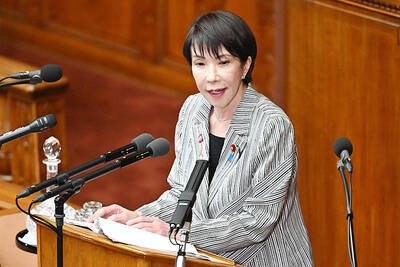China has carried out a land-based missile interception test that “achieved its expected purpose,” the Chinese Ministry of National Defense said, adding that it was for defensive purposes and not aimed at any country.
China has been ramping up research into many types of missiles, from those that could destroy satellites in orbit to advanced nuclear-tipped ballistic missiles, as part of an ambitious modernization scheme overseen by Chinese President Xi Jinping (習近平).
Beijing has tested missile interceptors before. The most recent public announcement of a test was in February last year, and before that in 2018.
State media said that China has conducted anti-missile system tests since at least 2010.
The ministry in a brief statement on Sunday said that the “ground-based midcourse anti-missile intercept technology” test had been carried out that night.
“The test reached its expected goals,” the ministry said. “This test was defensive and not aimed at any country.”
It provided no other details.
China, along with its ally Russia, has repeatedly expressed opposition to US deployment of the Terminal High Altitude Area Defense anti-missile system in South Korea, saying that the equipment’s powerful radar could penetrate into its territory.
China and Russia have also held simulated anti-missile drills.
China has given few details about its own missile programs, aside from occasional brief statements by the defense ministry or in state media.
In 2016, the ministry confirmed it was pressing ahead with anti-missile system tests after pictures of the operations appeared on state television.
Beijing said that such technology is needed for national defense and security.

‘SECRETS’: While saying China would not attack during his presidency, Donald Trump declined to say how Washington would respond if Beijing were to take military action US President Donald Trump said that China would not take military action against Taiwan while he is president, as the Chinese leaders “know the consequences.” Trump made the statement during an interview on CBS’ 60 Minutes program that aired on Sunday, a few days after his meeting with Chinese President Xi Jinping (習近平) in South Korea. “He [Xi] has openly said, and his people have openly said at meetings, ‘we would never do anything while President Trump is president,’ because they know the consequences,” Trump said in the interview. However, he repeatedly declined to say exactly how Washington would respond in

Japanese Prime Minister Sanae Takaichi said yesterday that China using armed force against Taiwan could constitute a "survival-threatening situation" for Japan, allowing the country to mobilize the Japanese armed forces under its security laws. Takaichi made the remarks during a parliamentary session yesterday while responding to a question about whether a "Taiwan contingency" involving a Chinese naval blockade would qualify as a "survival-threatening situation" for Japan, according to a report by Japan’s Asahi Shimbun. "If warships are used and other armed actions are involved, I believe this could constitute a survival- threatening

WARFARE: All sectors of society should recognize, unite, and collectively resist and condemn Beijing’s cross-border suppression, MAC Minister Chiu Chui-cheng said The number of Taiwanese detained because of legal affairs by Chinese authorities has tripled this year, as Beijing intensified its intimidation and division of Taiwanese by combining lawfare and cognitive warfare, the Mainland Affairs Council (MAC) said yesterday. MAC Minister Chiu Chui-cheng (邱垂正) made the statement in response to questions by Democratic Progressive Party (DPP) Legislator Puma Shen (沈柏洋) about the government’s response to counter Chinese public opinion warfare, lawfare and psychological warfare. Shen said he is also being investigated by China for promoting “Taiwanese independence.” He was referring to a report published on Tuesday last week by China’s state-run Xinhua news agency,

‘ADDITIONAL CONDITION’: Taiwan will work with like-minded countries to protect its right to participate in next year’s meeting, the foreign ministry said The US will “continue to press China for security arrangements and protocols that safeguard all participants when attending APEC meetings in China,” a US Department of State spokesperson said yesterday, after Beijing suggested that members must adhere to its “one China principle” to participate. “The United States insists on the full and equal participation of all APEC member economies — including Taiwan — consistent with APEC’s guidelines, rules and established practice, as affirmed by China in its offer to host in 2026,” the unnamed spokesperson said in response to media queries about China putting a “one China” principle condition on Taiwan’s